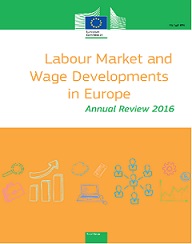Coucheir, Michael, Strban, Grega, Hauben, Harald, (2016), “The Legal and Operational Feasibility of a European Unemployment Benefits Scheme at the National Level”, CEPS, 26 Σεπτεμβρίου The objective of this paper is to investigate the legal and operational feasibility of a European unemployment benefits scheme (EUBS) as a specific form of supranational automatic stabiliser. This investigation forms part of a broader multidisciplinary analysis of the EUBS, encompassing inter alia a study …Read More
Labour Market and Wage Developments in Europe – Annual Review 2016
European Commission, (2016), “Labour Market and Wage Developments in Europe – Annual Review 2016”, European Commission, 27 Οκτωβρίου The Labour Market and Wage Developments in Europe report analyses the labour market from a macroeconomic perspective. It provides an analysis of recent employment and wage developments, looking at the euro area and the EU as a whole in comparison with its global trading partners. The 2016 edition shows that job creation …Read More
Central Banks and the Revenge of Politics
Otmar Issing, (2016), “Central Banks and the Revenge of Politics”, Project Syndicate, 1 Νοεμβρίου The reputation of central banks has always had its ups and downs. For years, central banks’ prestige has been almost unprecedentedly high. But a correction now seems inevitable, with central-bank independence becoming a key casualty. Σχετικές Αναρτήσεις Shen, Dennis, (2016), “Central banks are facing a crisis of confidence – it’s time to reinvent global monetary policy”, LSE …Read More
The danger of Germany’s current account surpluses: Results of the CFM and CEPR Survey
den Haan, Wouter, Ellison, Martin, Ilzetzki, Ethan, McMahon, Michael, Reis, Ricardo, (2016), “The danger of Germany’s current account surpluses: Results of the CFM and CEPR Survey”, VoxEu, 27 Οκτωβρίου The October 2016 expert survey of the Centre for Macroeconomics (CFM) and CEPR invited views from a panel of macroeconomists based across Europe on Germany’s trade surplus, its impact on the Eurozone economy, and the appropriate response of German fiscal policy. …Read More
Investment for Sustainable Growth
D.Sachs, Jeffrey, (2016), “Investment for Sustainable Growth”, Project Syndicate, 31 Οκτωβρίου The big disappointment in the world economy today is the low rate of investment. In the years leading up to the 2008 financial crisis, growth in high-income countries was propelled by spending on housing and private consumption. When the crisis hit, both kinds of spending plummeted, and the investments that should have picked up the slack never materialized. This …Read More
Business investment developments in the euro area since the crisis
European Central Bank, (2016), “Business investment developments in the euro area since the crisis”, ECB Publications, 31 Οκτωβρίου Business investment is both an important driver of the business cycle and a determinant of future growth prospects. While recovering less than in other advanced economies, the ratio of euro area real business investment to value added has recently surpassed its historical average. The recovery in investment is being driven by a …Read More
An anatomy of inclusive growth in Europe
Darvas, Zsolt, B.Wolf, Guntram, (2016), “An anatomy of inclusive growth in Europe”, Bruegel, 27 Οκτωβρίου This Blueprint offers an in-depth analysis of inequalities of income and wealth in the EU, as well as their causes and consequences. How evenly are the benefits of growth distributed in our economies, and what does this mean for fairness and social mobility? How could and should policymakers react? Σχετικές Αναρτήσεις Ilzkovitz, Fabienne, Dierx, Adriaan, (2016), …Read More
An Italian take on banking crisis
Merler, Silvia, (2016), “An Italian take on banking crisis”, Bruegel, 27 Οκτωβρίου The year 2016 has not been good to Italian banks. While resilient to the first wave of financial crisis in 2008, due to their low exposure to US sub-prime products and to the fact that Italy did not have a pre-crisis housing bubble, they have been suffering much from the euro sovereign crisis and the ensuing deteriorating economic …Read More
Why unconventional monetary policy works in theory
Farmer, Roger, Zabczyk, Pawel, (2016), “Why unconventional monetary policy works in theory”, VoxEu, 26 Οκτωβρίου Ben Bernanke famously quipped that monetary policy works in practice, but not in theory. This column bridges the gap between practice and theory in assessing how central banks can influence both of them by intervening in asset markets. To the extent that asset market volatility is driven by shifts in beliefs, the central bank should …Read More
Private sector debt matters, and better data means better policy
Lehmann, Alexander, (2016), “Private sector debt matters, and better data means better policy”, Bruegel, 27 Οκτωβρίου Private debt is emerging as a central concern in EU policy. However, the Commission’s regular country reports still give more attention to sovereign than private debt – even though there is always a risk that private liabilities will be socialised. Consistent and more detailed indicators of private debt distress could offer a more effective …Read More





